In Gloucester Cathedral there is a new stained glass window created by Tom Denny, which is a memorial to the Gloucestershire poet, Ivor Gurney. Like Will Harvey, whom I have written about before, he was a pupil and chorister at the Cathedral school before joining the Gloucestershire Regiment to serve in the First World War. Indeed, they were great friends. Gurney was a talented musician firstly, but in the thick of war, poetry became his creative outlet. Like Will Harvey he survived the war but was drastically changed by it. So much so that his fragile mental health was totally destroyed, and he spent many years in a mental asylum where he eventually died before he was 50. Gurney is buried at Twigworth, where his gravestone commemorates him as ‘poet composer of the Severn and Somme’.
Gurney’s poetry is beautiful and reflects his love for the Cotswolds, the countryside and the beauty of nature. I’d like to share 2 of them with you that touch me deeply for different reasons.
Firstly, To His Love which is a poem thought to be written by Ivor Gurney when he thought his friend Will Harvey had been killed.
To His Love’
He’s gone, and all our plans
Are useless indeed.
We’ll walk no more on Cotswolds
Where the sheep feed
Quietly and take no heed.His body that was so quick
Is not as you
Knew it, on Severn River
Under the blue
Driving our small boat through.You would not know him now…
But still he died
Nobly, so cover him over
With violets of pride
Purple from Severn side.Cover him, cover him soon!
And with thick-set
Masses of memoried flowers-
Hide that red wet
Thing I must somehow forget.
The second is The Bugle, written after Gurney returned from the war, a sadder and wiser man. I include it as my grandfather was a bugler in WW1, and also because it speaks to me loudly of how ordinary life and commerce still goes on while soldiers suffer and die ‘out of sight, and out of mind.’
The Bugle
High over London
Victory floats
And high, high, high,
Harsh bugle notes
Rend and embronze the air.
Triumph is there
With sombre sunbeams mixed of Autumn rare.
Over and over the loud brass makes its cry,
Summons to exultancy
Of past in Victory.
Yet in the grey street women void of grace
Chatter of trifles,
Hurry to barter, wander aimlessly
The heedless town,
Men lose their souls in care of business,
As men had not been mown
Like corn swathes East of Ypres or the Somme
Never again home
Or beauty most beloved to see, for that
London Town might still be busy at
Its sordid cares
Traffic of wares.
O Town, O Town
In soldiers’ faces one might see the fear
That once again they should be called to bear
Arms, and to save England from her own.
There are many learned websites with information about Ivor Gurney, but my wish today is simply to share the beauty and poignancy of the new window and explain a little of its background.
There are 8 lights or panes overall and each reflects something from the life and writing of Ivor Gurney. The notes are a precis of those that appear in the Cathedral by the window.
Light 1 ~ Glimmering Dusk ~ a figure walks at dusk in a Vale landscape. there are dark pools of rain on the white road and May Hill can be seen in the distance.
Light 2 ~ The Stone Breaker ~ In Flanders a chance encounter with some road menders reminds Gurney of a much earlier meeting (“Oh years ago and near forgot”), in the fresh beauty of a summer’s early morning, in a landscape of Vale orchards.
Light 3 ~ Brimscombe ~ Gurney remembers a night-time walk through the fir trees of the steep-sided Brimscombe valley near Stroud. The “pure clemency” of the moment enables him to forget the “blackness and pain” of France.
Light 4 ~ Severn Meadows ~This was written in March 1917 at Caulaincourt. As the sun sets over Severn meadows, a figure, in the shadow of a willow, looks back at the river and the willows.
Light 5 ~ Pain ~ Gurney recalls the grey-white Somme battlefield.
“Pain, pain continual; pain unending;….
Grey monotony lending
Weight to the grey skies, grey mud where goes
An army of grey bedraggled scarecrows in rows
Careless at last of cruellest Fate-sending.
Seeing pitiful eyes of men foredone,
Or horses shot, too tired to merely stir,
Dying in shell-holes both, slain by the mud.
…………………………………….
The amazed heart cries out to God.
Light 6 ~ To His Love ~ Probably drafted on the Somme battlefield, Gurney reacts to the news (false as it turns out) that his great friend, the poet Will Harvey, is presumed killed. A couple walk on the Cotswold hills as their dead friend lies among the violets.
Light 7 ~ To God ~ In the intense suffering from mental illness, surely aggravated by his experiences on the battlefields, Gurney cries out for death, “I am praying for death, death, death”.
Light 8 ~ Song and Pain ~ A more optimistic end to the window as a figure emerges from an understanding of pain to enter “The House of Joy”.
As I stood and gazed at these incredibly beautiful but harrowing windows, there were people around me moved to tears by what Gurney had seen and suffered. Tom Denny is a wonderful artist. He has captured and honoured Gurney’s genius, his love of Gloucestershire, and his suffering in that dreadful war and in his mental distress.
https://wordpress.com/post/heavenhappens.me/4977
http://www.ivorgurney.org.uk/biography.htm
http://movehimintothesun.wordpress.com/2011/04/22/to-his-love-ivor-gurney/
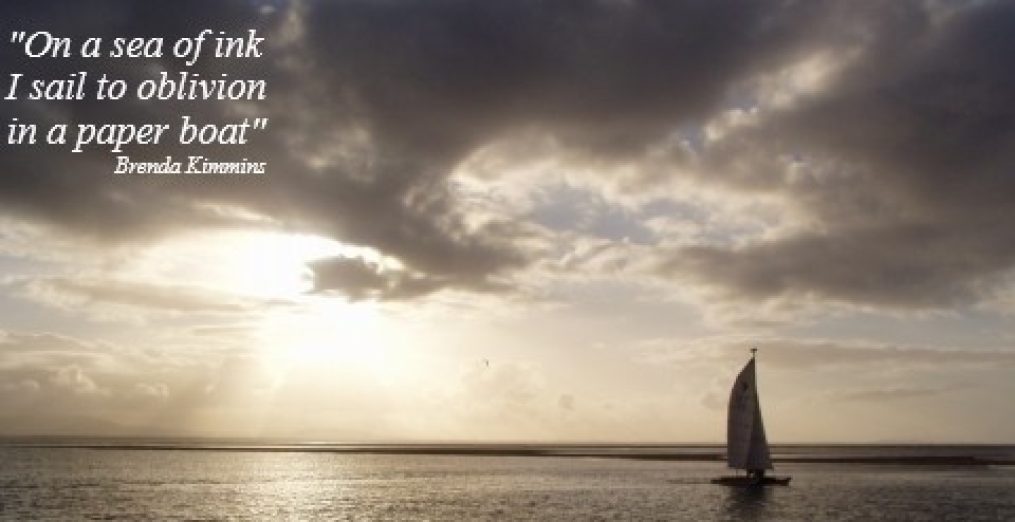
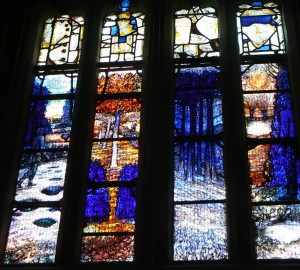
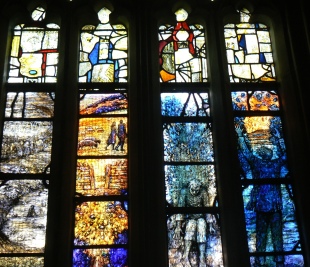
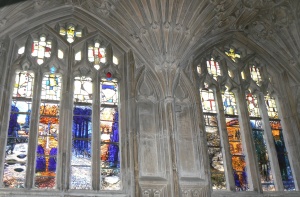
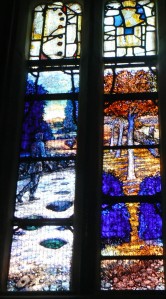
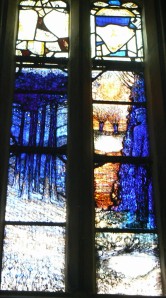
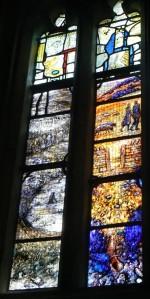
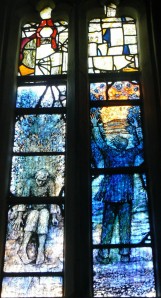
Came across the windows quite by chance a couple of weeks ago when we popped into Gloucester Cathedral on our way home from the Wye Valley. It would be so easy to miss them too, tucked away as they are off the Lady Chapel and with no obvious signage that we noticed. We are lovers of both Gurney’s and Finzi’s music so to find these wonderful images was a joy – they are astoundingly beautiful. And to then stumble today on the commentary here by Sarah Connolly has only added to the experience! I’m going to be talking about Gurney this Remembrance Sunday; as others have said, it’s strange that we remember the WWI poets more than the musicians, but he of course was both. Thanks to all who had a hand in this project.
LikeLiked by 1 person
I’m so glad you found the xquisite windows. Such moving tributes to sensitive souls.
Thank you so much for reading my blog and posting a comment. I appreciate it.
LikeLike
Where are you giving your talk?
LikeLike
I love stain glass. Thank you for this post/writing and the beautiful pictures. Oh so much to learn and be moved by. Blessings to amazing you! Thanks for sharing.
LikeLike
Im so honoured that you have been reading my blog. It is such a joy to share something as beautiful as these windows. I love seeing other people’s blogs for just that reason + we share what we see for the benefit of others who may not get to see these things in person.
Date: Sun, 5 Jun 2016 16:20:33 +0000 To: bkimmins@live.co.uk
LikeLiked by 1 person
And I thank you!
LikeLike
One day, whilst rifling through the English song draw marked G in the Royal College of Music library, I came across Ivor Gurney’s song, ‘Sleep’, and after playing and singing all the songs I had selected that session, his was the most startlingly beautiful.
Everyone who discovers ‘Sleep’ for the first time is deeply moved by it, history supports that. I was determined to find out about Ivor Bertie Gurney, since I felt his song expressed such character and depth and pain. later that year, I wrote an exam thesis about him, quite modest, but from then on, his songs were always included in my recitals, however lowly those concerts were as a young musician.
If only I had known that my harmony professor, Jeremy Dale Roberts had once been responsible for the fate of IBG’s entire musical oeuvre, after his friend and mentor Gerald Finzi had died. Finzi had successfully fought to rescue Gurney’s works from his jealous brother Ronald who had threatened to chuck the lot on the fire.
Think of the discussions Jeremy and I could have had! We have them now of course and I invited him and Joy and Kiffer Finzi to attend the fundraising concert, the unveiling and dedication ceremony of Tom Denny’s Gurney window in Gloucester two years ago.
The idea for a Gurney window was mine, and if I am grateful for any influence my career has afforded, it is that I did not even need to persuade the wonderful Glos Cathedral staff and Tom Denny, since they were unreservedly enthusiastic about it.
A few months later in a meeting with the wonderful Robin Lunn, who very sadly died recently, Tom Denny showed us his watercolour sketch of the 8 lights. I was moved to tears. I had requested that one light showed how Ivor suffered from what would be described today as Bi-Polar disease throughout his life. Shell-shock and the nightmare on the frontline would have heightened that condition to breaking point.
I also suggested to Tom that the lights be influenced directly by IBG’s poetry, since he was respected enough to be included in Westminster Abbey’s Poets’ Corner and a published poet in his own lifetime. Tom selected several poems to cleverly infuse each subject and the whole tone. At my request, the Cathedral agreed to display the poems next to the window.
To raise the funds to pay Tom and the Cathedral for hosting an all day/evening event, I needed to raise around 26k minimum. Selling 800 seats for the evening concert was proving difficult. Rupert Christiansen very kindly ran an article in the Daily Telegraph http://www.telegraph.co.uk/culture/10231723/Ivor-Gurney-tribute-to-an-outstandingly-talented-poet-and-composer.html some local museums helped along with a JustGiving campaign under the aegis of the Cathedral’s charitable status.
I would love to attach the programme of the day’s order of events but I don’t know how to do that! Please tell me? It would be of interest to many I’m sure. (Drag and drop?)
The funds were raised from the day’s music making and from generous donations. Artists kind enough to give up time in their busy schedules included Simon Callow, Dame Felicity Lott, James Gilchrist, Neal Davies, Vernon Harwood, Joseph Middleton, the English Chamber Orchestra, Tenebrae Choir, Adrian Partington, Professor Jeremy Dibble, Nigel Short, and composer Judith Bingham who also wrote A Walk with Ivor Gurney for myself and Tenebrae to perform on the occasion and to many others who helped and advised me.
At the dedication ceremony, where I sat next to composer Ian Venables, chairman of the Ivor Gurney Society, (of which I am now a proud patron), we both shed a few tears when the Dean Stephen Lake intoned the official words of welcome to Ivor Gurney who at last had a gorgeous tribute fitting to his status and life devoted to music and the Cathedral.
http://www.classical-music.com/news/gloucester-cathedral-pays-tribute-ww1-composer
LikeLike
Oh my goodness Sarah I am overwhelmed and honoured that you took time to read my blog and comment. It really is a joy to find out the background to this beautiful window series in memory of Ivor Gurney. I was moved to tears by the beauty of the windows and by his poetry.
How tragic war is for everyone involved, but especially for sensitive or troubled souls.
Thank you so much for all of this information. Would it be fitting for me to add it to the body of my text and credit you?
I am thrilled to learn more and I’m sure others would be too.
Thank you again.
LikeLike
As far as the programme of events goes you could take a photo or scan it then email or post it to me and I will insert it
bkimmins@live.co.uk
LikeLike
Fabulous post – interesting and informative 🙂
LikeLiked by 1 person
Thank you Polly, I enjoyed writing it.
LikeLiked by 1 person
Great post, beautiful poetry and the windows are stunning..
LikeLike
Thanks x the windows arI’m going to be a Tom Denny groupie and visit all his windows.
LikeLiked by 1 person
Thanks for the lovely comment. I appreciate it. I am struggling for inspiration at the moment after a summer from hell! We’ve had so many crises that I am burnt out and seem to have lost my creative muse. It is very good to read other blogs at times like this ~ I always find yours fascinating ~ and to get positive feedback is a real boost.
LikeLiked by 1 person
What a beautiful post!
LikeLike
I’m really glad you liked it. I adore stained glass windows, especially modern ones as they are just so colourful. I must search out his others and blog about them too.
I have not been blogging much lately as we have had the summer from hell ~ household disasters and hubby’s accidents but we are starting to pick up a bit. I find now I have no inspiration at the moment and i am really struggling to find anything to write about!
So I appreciate your comment, it has cheered me up no end!
LikeLike